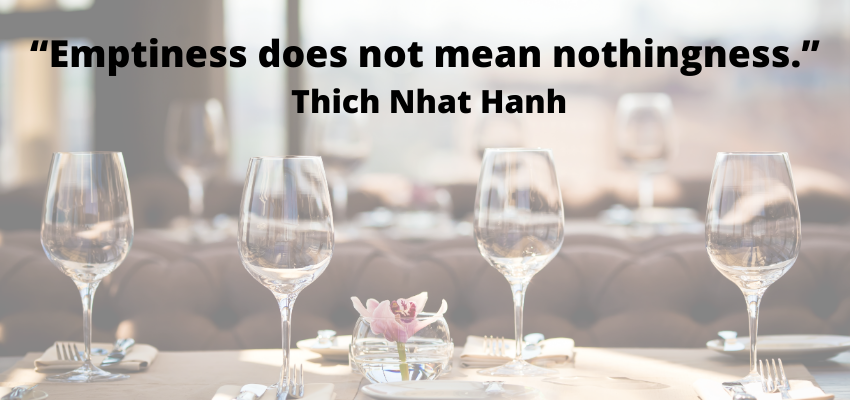By Darius E. Bennett, Esq.

To demonstrate this point, Thich Nhat Hanh raises what appears to be an empty glass, and challenges his audience with the query that if the glass is empty, then “Empty of what?” Walking softly and ably over the mental obstacles built by their assumptions, he continues his skillful ingress into the minds of his now rapt audience with the following thought, “In order for the glass to be empty, the glass has to be there.” Accordingly, emptiness is not nothingness rather a lack of something desired, or perhaps even more disquieting, the absence of one’s self.
That is the feeling of “failure,” the absence of something one wanted, maybe expected, or in the most injurious of circumstances, the absence of one’s self. The challenge is to focus on what is there, and this feat of mental wellness requires practice. Alex Honnold could not climb 3,200 feet to the top of El Capitan free-style without first having practiced the climb substantially. That same measure of practice is required to attain the mental wealth (i.e., practices that build a sound mind) necessary to focus on what is present instead of what we perceive as being absent.
Seven years ago, while living in Miami, I worked a two-month contract for a Legal Process Outsourcing company that had strict policies regarding how contractors were allowed to occupy its space and how contractors were allowed to fulfill the terms of the contract. Seven months earlier, I had lost my job as a litigation associate, and had wandered into contract work blindly but desperate for income. Sitting in a “pod,” this one in particular rather dark, for eight hours a day, surrounded by other frustrated, out-of-work attorneys, was not the result I expected after eight years of focus and hard work. Why was this room so dark? Why were the administrators insisting on and enforcing such a desolate silence? What happened to me? How had my life come to be so empty? I signed out of my team’s “pod” for a break, and went out to my car. Not even the sweltering Miami heat was more intense than the absence I felt. Intuitively, my mother called. It was one of those inexplicably well-timed, good-mother calls, as if she knew I was not well. In fact, quite unusually, she had called in the middle of a work day. I answered, and she said that I was “on [her] mind.” She asked how contract work suited me. I was brutally honest about the environment, expressed gratitude for having the piece-work and its income, and concluded my assessment with the dour acknowledgement, “I now realize that I have failed. It’s been hard for me to admit, but I can see it now.” My mother immediately and energetically parried, “You have not failed!” I could picture her face. She could feel my heaviness. She further insisted, “God is preparing you for something. You have not failed!” Gravely, I admitted her approach was healthier than mine, thanked her for the encouragement, and we ended the call proclaiming mutually, “Love you.” As I finished my lunch I thought, “Somethingis not nothing.” And, suddenly I had something. I got out of the car, and went back into the building to finish my day. I wondered, “What is the something?” That thought carried me weightless through the remainder of the contract, and I subsequently only accepted contracts where there was light and something. The glass, not the absence.
I would struggle mightily to create mental well-being for at least two more years. Long walks became a regular and key element of what would eventually become my mental wealth. Once I had mental wealth, I had clarity. Once I had clarity, I had a plan. I began to make meaningful connections, including re-connecting with a good friend I made while working as a contractor, who brought me that first big contract that allowed me to open my practice, and re-connecting with another friend who brought the second big contract that created solvency for my practice. Unexpectedly, the something from those trying first seven months had emerged, with astonishing sharpness. And, I realized that I had not failed. Rather, I had learned that I was not alone.

